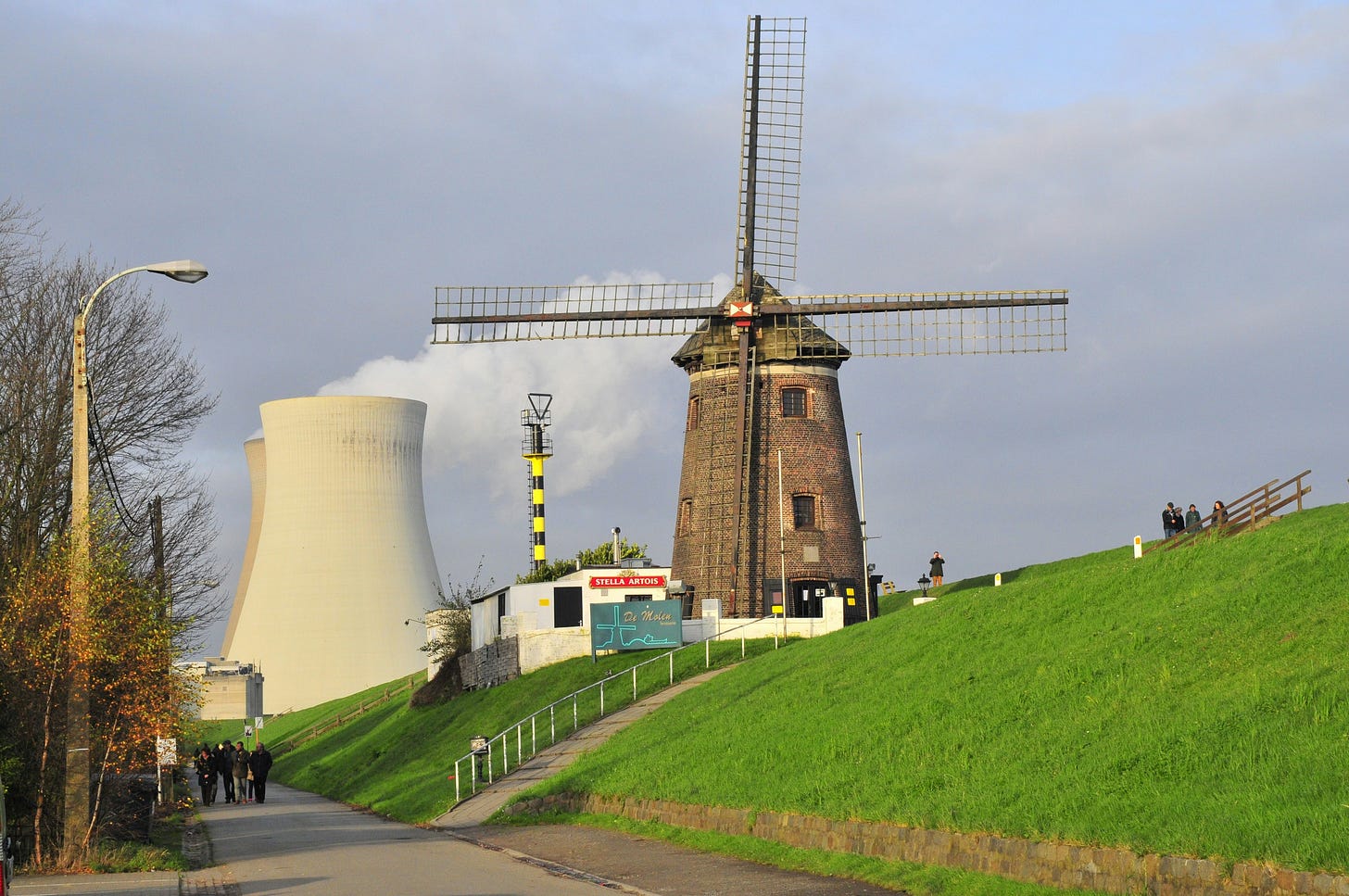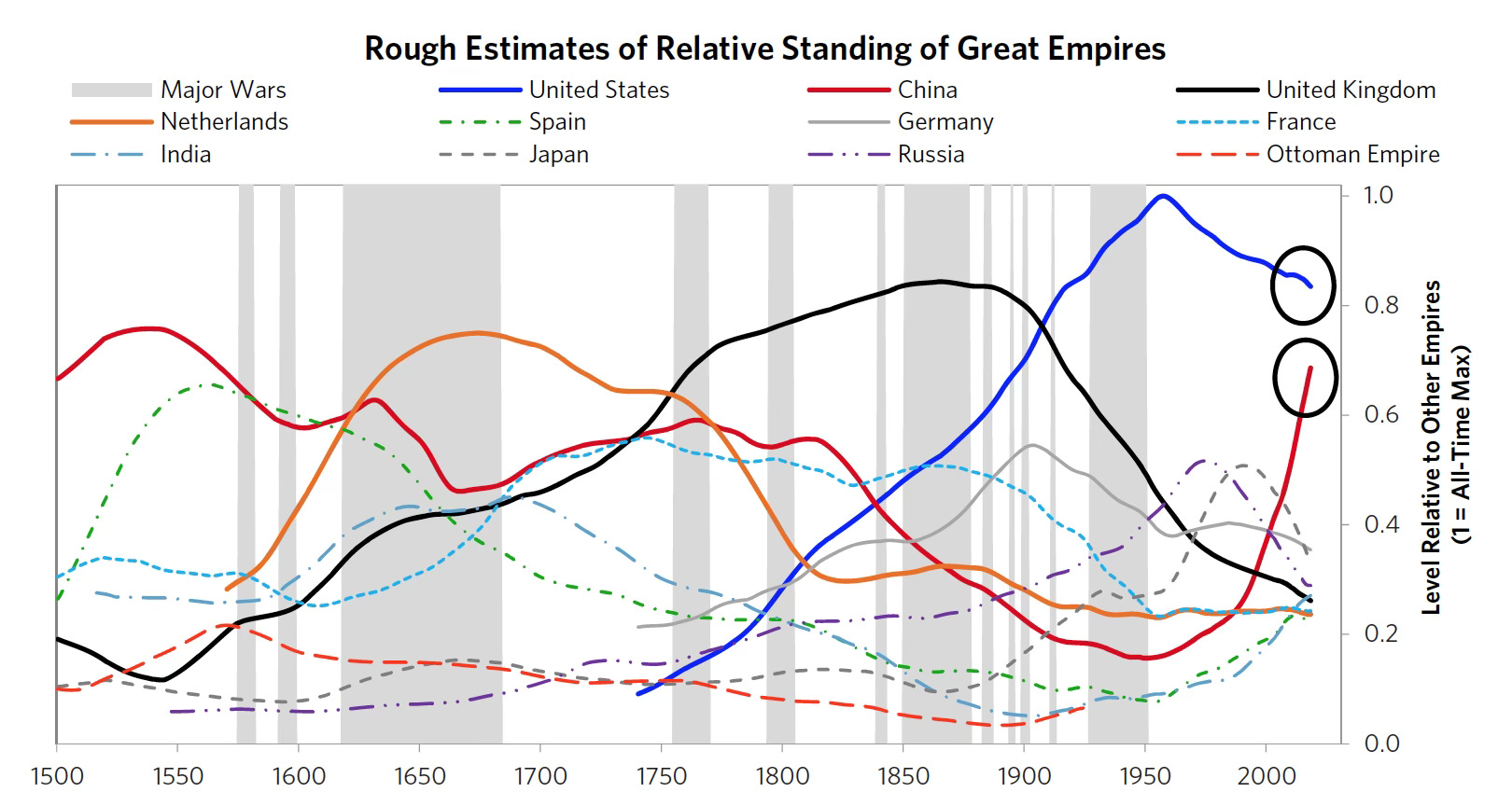The audio above is an AI-generated 'podcast' crafted with careful prompting and highly selected data sources, which you can view here. (Note that the bots incorrectly refer to 'Phase 6 and 70' in the Cycle of Globalization - it should be Phase 6 and 7/0 - meaning the concurrent end of one cycle and the start of the next.)
The metacrisis isn’t new. We’ve been here before. Just not quite this way. Or at least not the way we’re looking at it.
How about we look at it through the lens of Human Coordination Systems — how the ingenuity and creativity of large numbers of people have been channelled throughout history.
In medieval times, the lord controlled the land. Serfs worked the land.
Today, the lords control the cloud. Serfs surf mobile devices.
And now the lords are coming for power.
The Double Meaning of Power
Big Tech is investing in nuclear energy. These investments go beyond mere “sustainable energy.” It’s power squared — both literal and metaphorical.
Big Tech aren’t content to pay the electric bill anymore. They want to own the power plant. Specifically, they want thorium reactors that produce cleaner energy with less waste than traditional uranium systems.
Why? Because AI is hungry. Very hungry.
A single AI query consumes 10 times more electricity than a regular web search. By 2030, data centers will gobble up 9% of all electricity produced. The machine needs feeding.
The New Feudalism
This isn’t just about keeping the lights on. Or saving the planet with green power.
When Microsoft spends $1.6 billion to restart Three Mile Island’s dormant reactor, they’re not just securing power. They’re establishing a fiefdom.
When Google partners with Kairos Power to deploy 500 MW of small modular reactors, they’re not just going green. They’re becoming the new nobility.
We’re watching the emergence of technofeudalism in real-time. You and I become digital serfs, working the virtual land, generating value with every click and scroll, while the lords collect their rents from the cloud above. Soon they’ll be selling you surplus power too. The lords are coming for power.
The Dialectic Dance
History moves in patterns. Hegel called it dialectics — thesis creates antithesis, eventually resolving in synthesis.
There’s a power dance underway.
Thesis: State and privately generated fossil electricity
Antithesis: Tech generated thorium electricity
There’s also a monetary system dance underway.
The current thesis? A debt-based monetary system where privately-owned Central Banks issue money and extract rent through interest. When nations borrow money, the total global monetary deposits rise along with equivalent debt. These central banks control the elastic supply of the means of payment, acting as monopoly suppliers determining interest rates. They extract rental income from possession of financial assets that are artificially made scarce.
The emerging antithesis? Privately-issued digital currency — bypassing Central Banks — controlled through what Yanis Varoufakis calls “Technofeudalism.” In this system, tech giants have replaced traditional capitalism’s markets with digital platforms that function as fiefdoms. Companies like Google, Amazon, and Meta don’t simply participate in markets — they own the digital realms where exchange happens, extracting what Varoufakis terms “cloud rent.” Through these platforms, they influence our behaviors and choices while we labor as digital serfs, producing value for platform owners with every click and scroll. This represents a fundamental shift where the twin pillars of capitalism — markets and profits — have been replaced by platforms and rents, creating a neo-feudal order where big tech functions as the new aristocracy.
Both sides embody what Guy Standing calls “rentier capitalism” — where income derives not from productive activity but from ownership and control of scarce or artificially scarce assets. Whether through debt interest from central banks or power supply from tech giants, these represent what Marx termed “Absolute Rent” — the transfer of surplus between groups without any increase in value through production.
Both sides claim to serve our interests. Neither truly does.
The Convergence Crisis
What makes our moment unique isn’t just these dual dialectic dances, but the convergence of multiple system failures happening simultaneously.
It’s not just climate change AND economic inequality AND technological disruption. It’s how these crises feed each other, creating a battle for control of the masses by the elite class.
“Those afflicted by hubris become the agents of their own destruction. Like a tragic hero, a civilization comes to a ruinous end due to intrinsic flaws that are the shadow side of its very virtues.” — William Ophuls, Immoderate Greatness: Why Civilizations Fail
The metacrisis runs deeper than headlines suggest. It’s not just that things are breaking — it’s that the lords’ ways of attempting to fix things are breaking too.
Beyond The Binary
Most conversations about our future present false choices:
Individual behavior change or systemic transformation
Green growth or degrowth economics
Industry-led solutions or government regulation
Technology will save us or technology is the problem
These binaries miss what’s actually happening. They miss the synthesis emerging at the edges.
What if there’s a third path? A synthesis?
Research shows this dichotomous thinking creates “obstacles to creative solutions” and reveals how students “neither find comfort in the dominant techno-optimistic, eco-modernization narratives nor are they aware of any alternatives.” When we imagine solutions through these either/or frameworks, we limit our capacity to develop what researchers call “a multidimensional plurality of imagined growth futures.”
The metacrisis isn’t about choosing sides in these false binaries. It’s about recognizing that true transformation happens when multiple approaches converge rather than compete.
The Emerging Synthesis
In small communities around the world, people are building alternatives that transcend the thesis-antithesis trap:
Mutual credit systems like Sardex in Italy, where 4,500+ small businesses exchange goods without traditional currency
Community-owned energy cooperatives managing local resources as public commons
Governance models that distribute rather than concentrate power
These aren’t just nice ideas. They’re working models proving that another way is possible.
The Pattern Breaker
Throughout history, empires have followed predictable cycles — pioneers, conquests, commerce, affluence, decline, decadence, collapse.

But here’s the twist: knowing the pattern creates the possibility of breaking it.
What’s fascinating is that we’re witnessing multiple pattern-breaking attempts simultaneously. Two major resets were proposed within months of each other in 2020.
In June 2020, the World Economic Forum launched “The Great Reset Initiative” with then-Prince Charles and Klaus Schwab announcing plans to rebuild from the COVID-19 pandemic while prioritizing sustainable development. Their vision? A stakeholder economy built on environmental, social, and governance (ESG) metrics, harnessing what they call the Fourth Industrial Revolution. We all know how that’s going.
Then on October 15, 2020, the IMF declared a “New Bretton Woods Moment.” Just as the original Bretton Woods conference in 1944 established a new financial order after World War II, this announcement called for rebuilding the global economy amid pandemic devastation.
These aren’t just policy proposals. They’re competing visions for reordering global systems of human coordination.
What’s really happening is a power struggle over who gets to design the next phase of human slavery. The established financial institutions or the emerging technocratic elite? Old capital or new capital? Centralized authority or tech-enabled networks?
Meanwhile, we remain caught in the middle — digital serfs worried about our mortgage payments, food prices, and yes, climate change. The metacrisis isn’t just environmental collapse, technological disruption, or financial instability. It’s all of these together, compounded by the fact that those proposing solutions are often the same groups who benefited most from creating the problems.
“A society does not ever die ‘from natural causes,’ but always dies from suicide or murder— and nearly always from the former.” — D. C. Somervell - This quotation, or a paraphrase, is frequently attributed to Arnold Toynbee, but it actually comes from an editor’s note written by Somervell at the end of Chapter XV in the abridged version of the first six volumes of Toynbee’s A Study of History.
We’re right at the transition point between Phase 6 (Totalitarianism & Decay) and Phase 7/0 (Invasion & Emergence) of the well-established Cycle of Empire. It’s a frightening moment. But it’s also pregnant with possibility.
The real question isn’t which elite group will reshape our world. It’s whether we’ll embrace the evolutionary impulse — that deep tide of consciousness within every living cell driving us toward greater complexity, awareness, and interconnection. This isn’t abstract philosophy — it’s an active organizing principle within all living systems to adapt and evolve into higher expressions of themselves.
It’s up to us to embrace new forms of human coordination, and it’s already happening in bioregional regeneration — where people organize themselves in functional landscapes, re-localizing economies and restoring vital functions to their lands. These efforts involve co-creating human cultures patterned by the places they inhabit, refitting our social systems to the bio-geo-physical patterns through which life creates conditions conducive to life.
The pattern-breaker isn’t a new lord. And it isn’t a savior. It’s an entirely new pattern.
And the emerging pattern is still being written.
By all of us.
What You Can Do Today
The lords of the cloud are betting we’ll stay passive. That we’ll watch the thorium-powered reactors rise and do nothing but continue to consume what they produce.
They’re counting on our resignation. “It’s too complicated and out of my control.”
But resignation is a choice. And choices can change.
You might not be able to build a thorium reactor in your backyard. You might not create a global alternative to cloud capitalism overnight. But you can start small:
Join or introduce a local energy cooperative.
Learn about and participate in a mutual credit system.
Build relationships with people creating bioregional alternatives.
The emergence isn’t just happening to us — it’s happening through us. Which means we have agency to shape it.
References
Evolution of Social Organization: From hunter-gatherers to religions to markets to holism. Deep Dive
Big Tech and Thorium: companies like Microsoft, Google, Amazon, and Meta are investing heavily in small modular reactors (SMRs) and next-generation Thorium technologies to power their data centers sustainably. Deep Dive
Hegelian Dialectics: One of the most influential philosophical frameworks for understanding historical development and human progress. https://en.wikipedia.org/wiki/Dialectic and Deep Dive
Technofeudalism: An economic system that emerged in the 21st century, characterized by the dominance of Big Tech companies that have established a monopoly position and use sophisticated data extraction to secure it. Described in the book, Technofeudalism: What Killed Capitalism by Yanis Varoufakis (2024): https://www.amazon.com/dp/1685891241 and Deep Dive
Rentier Capitalism: An economic system that enables certain economic actors (“rentiers”) to extract value from the economy through various forms of rent-seeking behavior, including monopolistic practices, financial speculation, and the exploitation of intellectual property rights. It stands in stark contrast to Industrial Capitalism and State Capitalism. https://en.wikipedia.org/wiki/Rentier_capitalism and Deep Dive
Absolute Rent: A rent that is paid on all land, even the least fertile, because of the landowner’s ability to restrict access and prevent the free market forces that would drive down prices to the price of production. The existence of private land ownership creates a barrier that allows for rent to be paid even on land that, under a free market, would not generate any rent.
https://en.wikipedia.org/wiki/Differential_and_absolute_ground_rent and Deep Dive
The Great Reset Initiative: It was supported by a collaborative advertising campaign, with over 160 advertising agencies donating creative input under the banner of Purpose Disruptors and using the hashtag #CreateTheReset. A very large global youth contingent, instigated by Greta Thunberg and the PR (public relations) creatives behind her, coalesced as the Student Climate Network. The Great Reset Initiative was further supported by an academic network of Global Future Councils. Deep Dive
New Bretton Woods: The IMF is actively developing a new monetary framework centered on Central Bank Digital Currencies (CBDCs), positioning this digital transformation as a foundational thesis for a potential “New Bretton Woods” system. https://www.imf.org/en/Topics/digital-payments-and-finance and Deep Dive
Cycle of Globalization: a well-constructed cognitive map that can help us navigate the complexities of collapsing ecological, economic, and social systems by providing a framework for understanding and making sense of the chaotic world around us. Deep Dive
Phase 1 - Foundation: Mixture of cultures & stability after turmoil: 1648 - 1776
Phase 2 - Growth: Gestation & early development: 1776 - 1823
Phase 3 - Prosperity: Expansion & wellbeing for all: 1823 - 1929
Phase 4 - Warning: Overshoot & early conflicts: 1914 - 1972
Phase 5 - Decline: Hubristic leaders & overreach of empire: 1972 - 2009
Phase 6 - Crisis: Totalitarianism & decay of morals: 2009 - 2030?
Phase 7/0 - Transition: Invasion (internal or external) & emergence of the new: 2020 - 2050?












Share this post